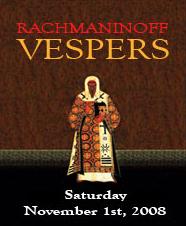Our 20th annual community Messiah sing! We will sing the first section -- plus the glorious “Hallelujah” chorus -- of Handel's familiar and always rewarding sacred oratorio. We sit by sections so you can sing your part in the choruses and the arias, while the recitatives will be sung by soloists from the chorus. Bring your own score, buy an inexpensive score at the door, or borrow one of the small number we have to lend. Admission is free, but in the sharing tradition of the season, we ask that you bring donations for the local food banks, in Bedford, the Lawrence Inter-Faith Endeavor (LIFE), and in Bloomington, the Hoosier Hills Food Bank.
Rachmaninoff: All-Night Vigil (Vespers)
 PERFORMANCE OF RACHMANINOFF MASTERPIECE SOOTHES THE SOUL
PERFORMANCE OF RACHMANINOFF MASTERPIECE SOOTHES THE SOUL
By Peter Jacobi, H-T ReviewerNovember 3, 2008
The attractive combination of the Bloomington Chamber Singers and Rachmaninoff’s “All-Night Vigil” enticed a sanctuary-filling audience to the spacious First United Church Saturday evening. The hushed quiet of the crowd throughout the hourlong concert and the enthusiastic response at its end strongly suggested that most everyone went away contented.
The “All-Night Vigil” takes only those 60 minutes. What one experiences, however, washes away specifics of time. The feeling engendered and sustained is one of expansive spirituality. An ambience of peace and quiet generates from Rachmaninoff’s score, written to inspire worshipers in the Russian Orthodox Church through music worthy of further ennobling the already noble sentiments of Vespers, a prayer service for evening, and Matins, one for morning.
Conductor Gerald Sousa drew from his 70-or-so choristers a compelling sincerity of performance, an imperative for a work uncharacteristic of those usually associated with its composer. Rachmaninoff is better known for his concertos, symphonies and piano pieces, these calling for virtuosity of technique and showmanship. Not so, the “All-Night Vigil.”
To master the Russian text and the blends of sounds is no easy task, mind you. Quite the contrary for an American, non-Russian-speaking choir, but the impression aimed for is the reverse of exhibitionism. And given a leader who understands and believes in the music, as Maestro Sousa obviously does, an ensemble of community versus professional status can be guided to become one with this stirring piece, even to make it soar. Sousa and friends did just that.
The performance was dedicated to the memory of Thomas Dunn, the notable and highly respected choral conductor and IU faculty member who passed away in late October. He would have been well pleased, one suspects.
In passages of praise and rejoicing, in those of gratitude and ever so tender, in expressions of uplift and supplication, in everything that a faith-driven Rachmaninoff poured into the Vigil, considered by many to be his masterpiece, Saturday’s host of Bloomington singers matched requirements. The musicians infused the score with depth of feeling, artlessness versus artifice, and a sense of devotion. They gave, in other words, their all, as vocalists and as purveyors of good thoughts and fervent togetherness.
Amid current world turmoil and the bitter bickering in a seemingly endless but, thank goodness, about-to-end political campaign, this “All-Night Vigil” — a potent expression of bonding in both substance and performance — proved especially welcome: restorative balm, no less.
Bach: St. Matthew Passion

CHAMBER SINGERS’ PASSION PERFORMANCE ‘A REVELATION’
By Peter Jacobi H-T ReviewerApril 7, 2009
Bach’s Saint Matthew Passion is a massive undertaking. It remains a miracle as composition, leaving us to wonder almost three centuries after it was written how it possibly could have been, considering the profundity of the score and the fact that Bach, while composing this grandeur, was continuing to produce music on a weekly basis for the Church of Saint Thomas in Leipzig and running all its choir activities.
For any performing entity, too, the presentation of the Saint Matthew Passion is a massive undertaking as well. It surely must have been for the Bloomington Chamber Singers and all the additional musicians that agreed to collaborate in the performance given Sunday afternoon at Saint John the Apostle Catholic Church.
The project began as a waking dream for Gerald Sousa, the BCS’s music director. He had conducted the work 20 years ago, driven to it then by the music’s power. It was time, he thought, to try it again, not only for himself as a matured musician but as a challenge for his chorus.
The challenge was more than well met. Sunday’s performance was a revelation, meaning that singers and instrumentalists were gratifying to hear and that Sousa’s understanding of the Passion was penetrating, loving and infectious.
It was a wonder, too, that he could move his chorus of part-timers from the community toward the lofty level of sound and interpretive acuity one heard; that he could gather and coalesce an orchestra prepared so successfully to obey his demands; and that he could find soloists — in small but amazing Bloomington — capable of meeting Bach’s steep vocal requirements.
But there they all were, in a church setting of greater width than depth, beautifully adaptable for the work’s antiphonal elements: a chorus split in two and set physically apart, an orchestral ensemble also divided in half, two organs (movable and brought in) and an additional children’s chorus (the sweet-sounding IU Children’s Choir) making a brief appearance at the rear of the sanctuary.
And there they were, singing and playing their utmost, accomplishing not only what Bach technically asked for but digging deep into the heart of this Passion, with text recounting the central narrative of the Christian faith, that leading to the Crucifixion, and with music designed to evoke reverence and renewed empathy for the story being told.
No better evangelist could have been found to musically relate that story than tenor Alan Bennett, his voice silver toned, his elocution pristine, his interpretation so forthright; nor could a more moving exponent have been chosen for the suffering Jesus than Daniel Narducci, he of a rich and resonant baritone and a sense for drama.
Baritone Curtis Crafton gave weight to the role of Pontius Pilate. As for those taxing Bach arias that comment on the biblical events being described, they were splendidly and expressively voiced by four fine soloists: soprano Angelique Zuluaga, mezzo-soprano Ursula Maria Kuhar, tenor Daniel Shirley and bass Joseph Beutel. Various members of the Chamber Singers doubled in minor yet key roles. Brent Gault and Lisa Yozviak deserve credit for preparing the IU Children’s Choir.
But it was the guiding light at the center, the man with the baton, conductor Sousa, who most deserves credit for having taken on the challenge and forging this absorbing and eloquent performance.
Mozart "Great" C minor Mass
Although less often performed than his Requiem Mass, Mozart's Great Mass in C minor, K.427 holds an astonishing combination of powerful choral settings and highly ornamental solos. It was apparently written to honor Mozart's promise to write a major mass if he was successful in marrying his beloved Constanze. It premiered in 1783, with his new bride singing the very demanding soprano arias. It is not quite complete (lacking the second half of the Credo and all of the Agnus Dei), but the Große Messe nonetheless is pure Mozart at his most passionate and emotional.
Also on the program are two works by Johann Sebastian Bach: Motet S. 225 and Cantata S. 190, both settings of the text Singet dem Herrn ein neues Lied (Sing to the Lord a New Song).
Soloists for the Bach S. 190 will be BCS Assistant Conductor, Julie Grindle, Alto; Daniel Shirley, Tenor; and Joseph Beutel, Bass.
For the Mozart, soloists will be Elizabeth Marshall, Soprano; Caitlin Shirley, Soprano; Daniel Shirley, Tenor; and Joseph Beutel, Bass.
Ticket price: $20 in advance, students & seniors; $22 at the door.
21st Annual Messiah Sing
Please feel free to download and print our PDF flyer for this event!
Our 21st annual community Messiah sing! We will sing the first section — plus the glorious “Hallelujah” chorus — of Handel’s familiar and always rewarding sacred oratorio. This year at St. Marks United Methodist Church in Bloomington, the “Hallelujah” chorus will be directed by a guest as selected during our Gala Benefit silent auction event, so if you've ever dreamed of conducting this beautiful oratorio be sure to come to the Gala!
We sit by sections so you can sing your part in the choruses and the arias, while the recitatives will be sung by soloists from the chorus. Bring your own score, buy an inexpensive score at the door, or borrow one of the small number we have to lend.
Admission is free, but in the sharing tradition of the season, we ask that you bring donations for the Hoosier Hills Food Bank in Bloomington, IN.
AutumnSong
Please download a copy or our AutumnSong flyer by clicking here and print and distribute to your community!
Our fall concert continues the series of seasonal celebrations begun several years ago with WinterSong. The musical offerings draw from traditional folk songs, Shaker hymns, and American spirituals, and from the work of composers Aaron Copland, Stephen Foster, Charles Ives, Stephen Paulus, and Eric Whitacre. Come hear these comforting reflections on the season of harvest and gathering in.
BCS Benefit Gala
BCS Benefit Gala
By Peter Jacobi, H-T Reviewer
September 6, 2009
With a gala concert and benefit this evening at the Unitarian Universalist Church, the Bloomington Chamber Singers (BCS) celebrate 40 years of offering choral music to the area and 20 years that they’ve done so under their conductor, Gerald Sousa. It is an occasion for them to be proud of and for those of us who’ve benefited from their efforts to be grateful.
The gifted and committed Sousa has made this group of non-professionals into an ensemble capable of grand performances, always astoundingly well prepared in technical terms and suffused with admirable sensitivity. Case in point: last spring’s remarkable go at the Bach St. Matthew Passion, an accomplishment that far surpassed reasonable expectations. But then, that’s what Maestro Sousa and his charges have done time and again, thereby adding significantly to Bloomington’s rich music scene.
Sousa’s assistant director at the BCS, and an alto within it, Julie Grindle, says the Bach was “a high point for the group. I think that was really evident in the performance. It’s been my privilege to work closely with Gerry, and I have become a better musician because of him . . His talent for leading a choir is only surpassed by the sensitivity, integrity and thoughtfulness that he brings to musical preparation.”
For Sousa, the 20-year association has obviously been a labor of love for the music, the task and his singers. “I am gifted with a group,” he says, “that understands high-level performance must move beyond singing the right notes at the right time. I am able to explore the works with the singers on a number of levels . . In rehearsal, we explore not only the music itself but the meaning and sounds of the text, the historical and social context of the work and the structural elements that form its architecture.
“Rehearsing, then, for us, is often in layers,” he explains. “One must first be able to sing the right words to the right notes at the rime time in the right intonation, and so forth. But then, one must understand the meaning and syntax of the language, the larger intent of the work, the tonal and harmonic devices that the composer uses to bring the text to life, and the reason for variances in dynamics, tone color and timbre. I’m notorious for passing out color charts of the works we study to help everyone understand the overall form of the piece and the various compositional devices the composer uses.”
Barrie Zimmerman, a tenor in the BCS since 1994, calls rehearsals with Sousa “demanding, challenging, fun, educational and highly rewarding. One has to stay on one’s toes for two-and-one-half hours, but it takes one’s mind off everything else. Gerry has continually demonstrated a totally unselfish desire to share his knowledge of music.” As a result, says Zimmerman, “Very likely, BCS is the best community chorus — non-professional — in a wide geographic part of the Midwest.”
Lisa Kurz, who joined the sopranos in 1993, says, “Gerry is a stickler. He wants not only every note but every vowel in every word, every dynamic and expressive nuance to be exactly right. . In general, rehearsals are fun. We’re not always serious by any means, but we all know that we’re there to learn the music and to sing it as well as we can. Artistically, Gerry’s contribution has been enormous . . He has brought us stability. To have the same musical director for 20 years has definitely contributed to our growth as a musical group.”
Jason Siegel, a relative newcomer to the BCS with four years of service, says Sousa is “wonderful as a leader,” someone who has “high expectations of us, musically and professionally and makes it clear that his expectations are only going to get higher.”
However, Siegel continues, “rather than being intimidating, it feels quite comforting and encouraging knowing that we have someone who believes in us so much.”
“For me,” says Sousa, “performing each piece of great music is a transient love affair. There is the first instinctive and visceral attraction to the work. Then, there is the wonderful and sometimes confusing process of getting to know the work in depth, during which I grow increasingly attached as I unravel the work’s various threads. Then, there is the pre-performance period during which I am usually completely infatuated — in love — with the music. Then, there is the performance which is the wonderful culmination of all that we have shared over many months together. Finally, there is the inevitable postpartum when I see a close friend slip away from being with me every day. One must love what one performs.”
Ruth Sanders, a member of the soprano contingent since 1980, long before Sousa became music director, notes that he was the first to stay with the group.
“Most of the leaders before were graduate students in choral conducting who left for professional positions after finishing their degrees. Gerry lives in Bloomington and wants to stick with us, and we very much want to keep him with us. The continuity in having one director for 20 years is an important part of our success.”
Sanders says being in the BCS “has been like having an ongoing weekly class in musical technique and music history, combined with anatomy, physiology, philosophy and whatever else comes up.”
She points to the “fine music” as a major BCS contribution to the community, along with “the opportunity it affords to non-professionals, those of us with day jobs who have no intention of ever being professional musicians, to sing serious music in a serious way. We all take our task very personally and put hours into the preparation of each concert and we love that the community turns out and seems to love the concerts.”
Bernadette Zoss, a six-year veteran and alto, expresses thanks to Sousa and her colleagues for giving her a “choral home.” As chair of the BCS’s long-range planning committee, she names financial stability “as the biggest challenge facing us. We’re self-sustaining, and we’ve been able to maintain a small financial cushion to weather disruptions like the current weak economy, but it’s difficult to identify funding sources even in good economic times. Performing the kind of music we do requires paying for orchestra personnel, scores and more, which is very costly. Each member pays annual dues, and we buy our own copies of the music we perform. Ticket sales only cover about a third of our annual budget. The balance must be made up by individual and corporate donations, selling ads in programs and fundraising efforts.”
Sousa is bullish. He says the BCS commands “an enviable position,” with an “efficient, effective self-governing organization” that “rests on a solid financial foundation. We have very little attrition, play to full houses, and are able to mount virtually any piece in the repertoire. We have a bevy of generous corporate and individual donors that underwrite our seasons. Whatever success we now enjoy owes its existence solely to the unfailing passion for excellence in music that all of us share.”
The maestro sums up that he “would like to see the group bring its music making to a wider audience for I believe the music we perform needs to be heard.”
That’s a sentiment I echo, and may there be many more happy birthdays for the Bloomington Chamber Singers.


